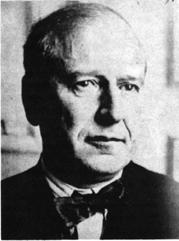Christian Rakovsky
| Christian Rakovsky Кръстьо Раковски, Xристиан Георгиевич Раковский, Християн Георгійович Раковський, Cristian Racovski |
|
|---|---|
 |
|
| 1st Chairm. of the Council of People's Commissars of the Ukrainian SSR | |
|
In office January 16, 1919 – July 15, 1923 |
|
| Preceded by | Georgiy Pyatakov |
| Succeeded by | Vlas Chubar |
| Soviet Ambassador to France | |
|
In office October 1925 – October 1927 |
|
| Preceded by | Leonid Krasin |
| Succeeded by | Valerian Dovgalevsky |
| Personal details | |
| Born |
August 13, 1873 Gradets, Ottoman Empire (now Bulgaria) |
| Died | September 11, 1941 (aged 68) Oryol, Russian SFSR, Soviet Union |
| Nationality | Bulgarian, Romanian, Russian, Soviet, Ukrainian |
| Political party |
Communist Party of the Soviet Union Communist Party (Bolsheviks) of Ukraine |
| Spouse(s) | E. P. Ryabova (desc.) Alexandrina Alexandrescu (Ileana Pralea) |
| Profession | physician, journalist |
| Signature | |
Christian Rakovsky (August 13 [O.S. August 1] 1873 – September 11, 1941) was a Bulgarian socialist revolutionary, a Bolshevik politician and Soviet diplomat; he was also noted as a journalist, physician, and essayist. Rakovsky's political career took him throughout the Balkans and into France and Imperial Russia; for part of his life, he was also a Romanian citizen.
A lifelong collaborator of Leon Trotsky, he was a prominent activist of the Second International, involved in politics with the Bulgarian Social Democratic Union, Romanian Social Democratic Party, and the Russian Social Democratic Labour Party. Rakovsky was expelled at different times from various countries as a result of his activities, and, during World War I, became a founding member of the Revolutionary Balkan Social Democratic Labor Federation while helping to organize the Zimmerwald Conference. Imprisoned by Romanian authorities, he made his way to Russia, where he joined the Bolshevik Party after the October Revolution, and, as head of the Rumcherod, unsuccessfully attempted to generate a communist revolution in the Kingdom of Romania. Subsequently, he was a founding member of the Comintern, served as head of government in the Ukrainian SSR, and took part in negotiations at the Genoa Conference.
...
Wikipedia
